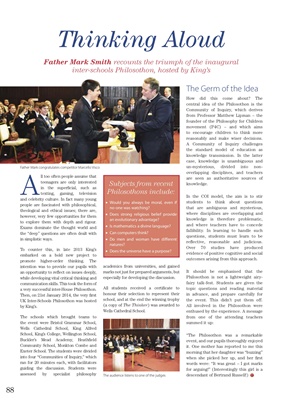
All too often people assume that
teenagers are only interested
in the superficial, such as
texting, gaming, television
and celebrity culture. In fact many young
people are fascinated with philosophical,
theological and ethical issues; there are,
however, very few opportunities for them
to explore them with depth and rigour.
Exams dominate the thought world and
the "deep" questions are often dealt with
in simplistic ways.
To counter this, in late 2013 King's
embarked on a bold new project to
promote higher-order thinking. The
intention was to provide our pupils with
an opportunity to reflect on issues deeply,
while developing vital critical thinking and
communication skills. This took the form of
a very successful inter-House Philosothon.
Then, on 21st January 2014, the very first
UK Inter-Schools Philosothon was hosted
by King's.
The schools which brought teams to
the event were Bristol Grammar School,
Wells Cathedral School, King Alfred
School, King's College, Wellington School,
Buckler's Mead Academy, Heathfield
Community School, Monkton Combe and
Exeter School. The students were divided
into four "Communities of Inquiry," which
ran for 20 minutes each, with facilitators
guiding the discussion. Students were
assessed by specialist philosophy academics from universities, and gained
marks not just for prepared arguments, but
especially for developing the discussion.
All students received a certificate to
honour their selection to represent their
school, and at the end the winning trophy
(a copy of The Thinker) was awarded to
Wells Cathedral School.
The Germ of the Idea
How did this come about? The
central idea of the Philosothon is the
Community of Inquiry, which derives
from Professor Matthew Lipman - the
founder of the Philosophy for Children
movement (P4C) - and which aims
to encourage children to think more
reasonably and make wiser decisions.
A Community of Inquiry challenges
the standard model of education as
knowledge transmission. In the latter
case, knowledge is unambiguous and
un-mysterious, divided into nonoverlapping disciplines, and teachers
are seen as authoritative sources of
knowledge.
In the COI model, the aim is to stir
students to think about questions
that are ambiguous and mysterious,
where disciplines are overlapping and
knowledge is therefore problematic,
and where teachers have to concede
fallibility. In learning to handle such
questions, students must learn to be
reflective, reasonable and judicious.
Over 70 studies have produced
evidence of positive cognitive and social
outcomes arising from this approach.
It should be emphasised that the
Philosothon is not a lightweight airyfairy talk-fest. Students are given the
topic questions and reading material
in advance, and prepare carefully for
the event. This didn't put them off.
All involved in the Philosothon were
enthused by the experience. A message
from one of the attending teachers
summed it up:
"The Philosothon was a remarkable
event, and our pupils thoroughly enjoyed
it. One mother has reported to me this
morning that her daughter was "buzzing"
when she picked her up, and her first
words were: "It was great - I got marks
for arguing!" (Interestingly this girl is a
descendant of Bertrand Russell!)
Thinking Aloud
Father Mark Smith recounts the triumph of the inaugural
inter-schools Philosothon, hosted by King's
Father Mark congratulates competitor Marcello Visco
Subjects from recent
Philosothons include:
• Would you always be moral, even if
no-one was watching?
• Does strong religious belief provide
an evolutionary advantage?
• Is mathematics a divine language?
• Can computers think?
• Do men and woman have diferent
natures?
• Does the universe have a purpose?
The audience listens to one of the judges
88